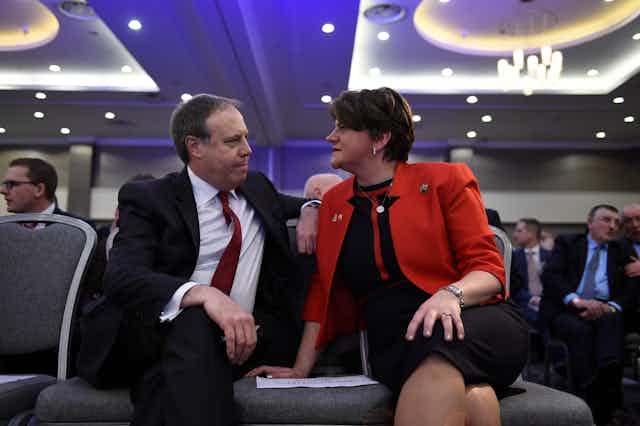In its latest attempt to bolster support for its Brexit withdrawal agreement, the UK government has published another document on the future of Northern Ireland.
It seeks to assuage the concerns of those, primarily unionists, who fear that the withdrawal agreement’s “backstop” provisions, if they come into force, will weaken Northern Ireland’s relationship with the rest of the UK. For many, the solution to this problem is to give the Northern Ireland Assembly and Northern Ireland Executive a greater say in how the withdrawal agreement is implemented.
Coincidentally, this latest paper was published two years to the day that devolved government in Northern Ireland collapsed on January 9 2017. Neither the Northern Ireland Assembly nor the executive has met since.
For the prime minister Theresa May, assuaging these concerns is a vital element of her efforts to convince MPs, particularly those from the Democratic Unionist Party (on which the government depends for majority support in the House of Commons), ultimately to support the withdrawal agreement. Their backing is vital if, in the absence of any opposition support, she is to win the “meaningful vote” scheduled to take place in parliament on January 15.
What the document says
The paper reiterates many of the statements made by the UK and the EU since the backstop idea first emerged towards the end of 2017. The main commitment is to ensure that the future relationship between the UK and EU, which will be decided during the two-year transition period that begins on March 29, will avoid the need for the backstop provisions to come into force at all.
The UK government promises that the Northern Ireland Executive and the Northern Ireland Assembly will be given “a strong voice in any scenario where the backstop would be brought into force”. Here the paper commits the UK government “in law” to a “mandatory process of consultation” before the end of 2020 so that the Northern Ireland Assembly can debate and then express its view on whether the UK should seek to extend the transition period or, by default, accept the entry into force of the backstop, assuming, as is likely, a post-Brexit UK-EU relationship negating the need for a backstop is not in place.
Next, the view of the Northern Ireland Assembly would then be “brought before parliament prior to a vote at Westminster”. How parliament would respond would be left to MPs. There is therefore no Northern Ireland Assembly veto on implementing the backstop. Moreover, even if the Northern Ireland Assembly did opt to support an extended transition period, once that expired, again in the absence of an appropriate post-Brexit UK-EU relationship, the backstop would automatically enter into force.
If the backstop is triggered, the UK government will consult the Northern Ireland Assembly where the EU proposes adding “new areas of law” applying specifically to Northern Ireland. In only “seeking agreement” of the assembly, the UK government will clearly not be providing it with a veto. The decision on whether new areas of EU law will apply will be for the UK government to take.
A further commitment is to Northern Ireland businesses retaining “the same unfettered access” to the whole of the United Kingdom internal market. The UK has now agreed to guarantee that unfettered access in law by enshrining it in primary legislation.
To minimise the amount of additional checks and controls on the movement of goods from the rest of the UK into Northern Ireland, should the backstop be triggered, the UK government has also agreed that there will be no regulatory divergence between the two, thus implying the maintenance of regulatory alignment with the EU.
Still not on board
Reaction to all this from unionists has generally been dismissive. The DUP has described the commitments concerning the role of the Northern Ireland Assembly as “cosmetic and meaningless” and bemoaned the continued lack of an exit option from the backstop. The leader of the Ulster Unionist Party (UUP), Robin Swann, has described the paper as “frankly insulting”.
The UK government’s commitments clearly have not assuaged concerns. This is a reflection of the constraints under which it is operating. Chief among these is the fact that it has concluded the deal with the EU. After making significant concessions, neither side is willing to reopen negotiations.
Also, the UK government needs to avoid creating any domestic constraints – for example by allowing the Northern Ireland Assembly to veto the entry into force of the backstop – that would prevent it from fulfilling its international obligations under the withdrawal agreement.
The DUP has indicated that there are “some elements of the paper that could be improved and built upon”. The paper could turn out therefore to be an initial bid to assuage concerns. If May fails to get support in the House of Commons for the withdrawal agreement at her first attempt on January 15, the UK government may well find itself forced to make some additional commitments.
If it does present a second version it should also address a major omission. The paper generally assumes a functioning Northern Ireland Assembly and a Northern Ireland Executive. There is no mention, however, of how Northern Ireland’s voice will be heard if the current situation of dysfunctional devolution continues (or there is a reversion to direct rule).
The UK government is not alone in hoping that the Northern Ireland Assembly and a Northern Ireland Executive will soon be back up and running. An orderly Brexit would help clear the way. But no one should hold their breath.

